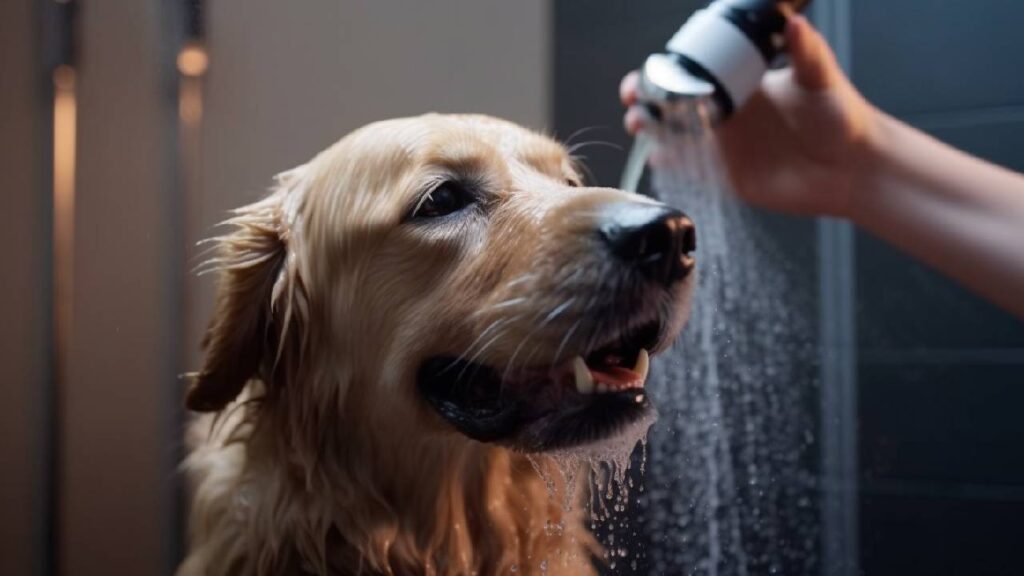In our quest to keep our canine companions clean and fresh, the question often arises: Can you use human shampoo on dogs? While sharing our shampoo with our four-legged friends might seem convenient, there’s more to this decision than meets the eye. One key factor is our products’ acidity, alkalinity, or pH balance.
Acidity and Alkalinity
Understanding pH balance is crucial for your dog’s skin and overall health. The pH scale ranges from 0 to 14 and tells us if something is acidic or alkaline. Human skin is slightly acidic, with a pH of about 5.5. In contrast, a dog’s skin is somewhat more alkaline, with pH levels typically ranging from 6.2 to 7.4. This pH level difference is essential when caring for your dog’s skin.
Can I Use Human Shampoo For My Dog?
Human shampoos are carefully formulated to match the acidity of our skin. While they might effectively cleanse our hair and skin, they can be too harsh for our canine companions. Applying shampoo with a pH intended for human skin to your dog’s coat can disrupt their skin’s pH equilibrium. This disruption can lead to various issues, including dryness, itchiness, redness, and even more severe problems like bacterial or fungal infections.
Moreover, the pH balance affects the effectiveness of a shampoo’s cleaning and conditioning properties. A mismatched pH can harm your dog’s skin and interfere with how well a shampoo cleanses and conditions its coat. A shampoo designed for dogs ensures it aligns with their skin’s pH requirements, effectively cleansing without damaging essential oils or causing irritation.

What is the Best Shampoo for Dogs?
- pH-Balanced Formulas: Choose a specifically formulated shampoo to match your dog’s pH levels. Look for products with pH levels of 6.2 to 7.4, ideal for dogs’ slightly alkaline skin.
- Natural Ingredients: Opt for shampoos with natural ingredients such as oatmeal, aloe vera, chamomile, and tea tree oil. These ingredients are known for their soothing, moisturizing, and antimicrobial properties, providing multiple benefits for your dog’s skin and coat.
- Hypoallergenic Options: Consider hypoallergenic shampoos if your dog has sensitive skin or allergies. These are formulated to minimize the risk of allergic reactions or irritations, making bath time a more comfortable experience for your furry friend.
- No Harsh Chemicals: Avoid shampoos that contain harsh chemicals like parabens, sulfates, and artificial fragrances. These can strip the natural oils from your dog’s skin, leading to dryness and irritation.
- Coat-Specific Formulas: Different coat types have varying needs. Whether your dog has a short, long, curly, or double coat, shampoos are designed to address their specific requirements, such as detangling or adding shine.
- Veterinarian Recommendations: Consulting your veterinarian is invaluable. They can recommend a shampoo based on your dog’s breed, skin condition, and any existing health concerns.
How Often Should You Use Shampoo On Dogs?
The frequency at which you should shampoo your dog depends on several factors, including the dog’s breed, coat type, activity level, and overall health. Here are some general guidelines:
- Breed and Coat Type: Dogs with different coat types may require different shampooing schedules. For example, dogs with long or thick coats may need more frequent bathing than those with short, smooth coats. Breeds like Poodles and Bichon Frises often require regular bathing and grooming due to their curly or dense fur.
- Activity Level: More active dogs that spend much time outdoors may need more frequent baths, especially if they get dirty or muddy regularly.
- Skin Conditions: If your dog has a skin condition or medical issue, your veterinarian may recommend a specific bathing schedule and type of shampoo to help manage the condition.
- Odor and Dirt: You can generally judge when to bathe your dog by assessing their smell and cleanliness. If they develop a noticeable odor or get visibly dirty, it’s time for a bath.
Most dogs do not need frequent baths as excessive bathing can strip their skin and coat of natural oils, leading to dryness and skin issues.
Conclusion
Using human shampoo on dogs can be tempting due to its accessibility and variety, but it’s not advisable. Dogs have more sensitive skin with a different pH balance than humans. Human shampoos can cause skin irritation, dryness, and potential infections in dogs.
Dog-specific shampoos are pH-balanced and contain ingredients like oatmeal or aloe vera to soothe and moisturize their skin, ensuring their well-being. It’s best to use dedicated dog shampoos for your furry friend’s health and comfort.

FAQs
Why is pH balance important for dogs?
Dogs have a different skin pH than humans, and using human shampoo can disrupt their natural pH balance, leading to skin issues.
What are the risks of using human shampoo on dogs?
Risks include dryness, irritation, itchiness, and even skin infections due to the mismatched pH levels.
How often should I bathe my dog?
The frequency depends on the breed and activity level. Most dogs benefit from a bath every 4-6 weeks, but over-bathing can strip natural oils.
Are natural shampoos better for dogs?
Natural dog shampoos with gentle ingredients are often better for dogs as they are less likely to cause irritation or allergic reactions.
Can I use dog shampoo on puppies?
Yes, but it’s essential to choose a puppy-specific shampoo that’s mild and gentle on their developing skin.
What should I do if my dog experiences skin irritation after shampoo use?
Discontinue use immediately and consult your veterinarian for advice on soothing your dog’s irritated skin.






the article is useful, but it is still better to pass the tests, consult a veterinarian and then choose the best remedy for your dog
Never realized how important dog-specific shampoos are until my dog, Bella, had skin issues. Now I only use the good stuff for her baths.
I used to use my shampoo on my dog, but now I learned it’s not ideal
I’ve used my shampoo on my pup. Learned it might not be the best idea…
I’m not sure if it’s recommended. What’s the best shampoo for dogs? 🚿🐶